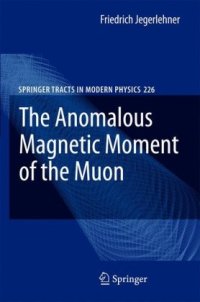
Ebook: The Anomalous Magnetic Moment of the Muon
- Genre: Physics // Electricity and Magnetism
- Tags: Elementary Particles and Nuclei
- Series: Springer Tracts in Modern Physics 226
- Year: 2008
- Publisher: Springer-Verlag Berlin Heidelberg
- City: Berlin; New York
- Edition: 1
- Language: English
- pdf
It seems to be a strange enterprise to attempt write a physics book about a single number. It was not my idea to do so, but why not. In mathematics, maybe, one would write a book about ?. Certainly, the muon’s anomalous magnetic moment is a very special number and today re?ects almost the full spectrum of e?ects incorporated in today’s Standard Model (SM) of fun- mental interactions, including the electromagnetic, the weak and the strong forces. The muon g? 2, how it is also called, is a truly fascinating theme both from an experimental and from a theoretical point of view and it has played a crucial role in the development of QED which ?nally developed into the SM by successive inclusion of the weak and the strong interactions. The topic has fascinated a large number of particle physicists, last but not least it was always a benchmark for theory as a monitor for e?ects beyond what was known at the time. As an example, nobody could believe that a muon is just a heavy version of an electron; why should nature repeat itself, it hardly can make sense.
This book reviews the present state of knowledge of the anomalous magnetic moment a=(g-2)/2 of the muon. The muon anomalous magnetic moment amy is one of the most precisely measured quantities in elementary particle physics and provides one of the most stringent tests of relativistic quantum field theory as a fundamental theoretical framework. It allows for an extremely precise check of the standard model of elementary particles and of its limitations. Recent experiments at the Brookhaven National Laboratory now reach the unbelievable precision of 0.5 parts per million, improving the accuracy of previous g-2 experiments at CERN by a factor of 14. A major part of the book is devoted to the theory of the anomalous magnetic moment and to estimates of the theoretical uncertainties. Quantum electrodynamics and electroweak and hadronic effects are reviewed. Since non-perturbative hadronic effects play a key role for the precision test, their evaluation is described in detail. After the overview of theory, the experimental achievements are surveyed, and comparisons with theory are discussed. Possible explanations for the observed deviation are presented. Perspectives for future improvements of the theoretical and experimental precision are considered. This reference text for researchers in elementary particle physics requires some basic knowledge of relativistic quantum field theory and elementary particle theory.